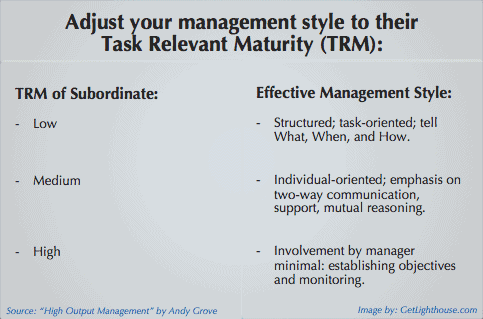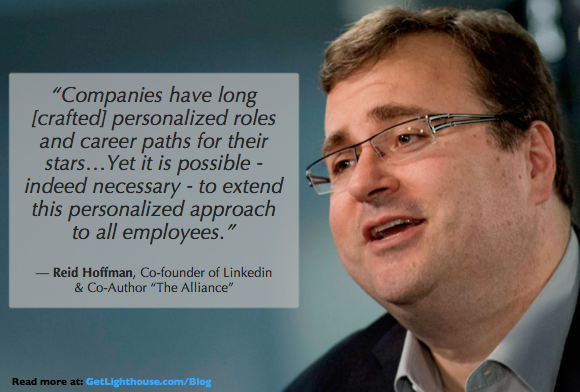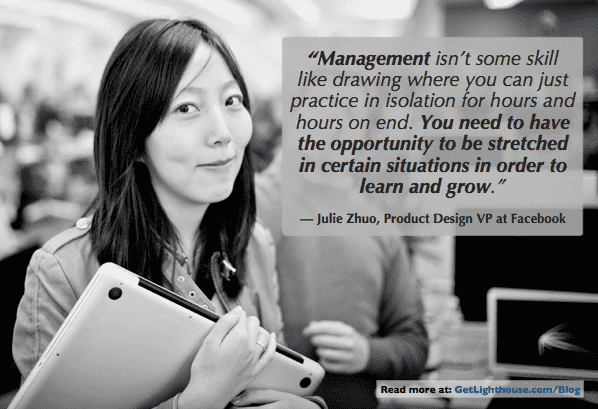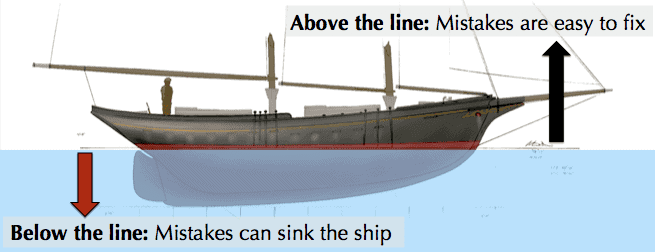Being a new manager can be an exciting, and stressful, opportunity. It's a great promotion, with new responsibilities, added prestige, and the pay bump to match.
It's also a major career change to a world very different than what you learn in any school or classroom.
It's important that you promote people looking to be a manager for the right reasons, and that they have the right skills and mindset.
However, once you promote them, your work is just beginning. Without help, a new manager is set up to flounder and fail.
Today, we explore how to support a new manager, including the 4 most important things you can do to ensure your new manager succeeds.

How to Help a New Manager Succeed from Day 1
"The best day to plant a tree is 20 years ago. The second best day is today." - Chinese Proverb
If you promoted a new manager awhile ago and they're struggling, all of these approaches will still work to help them. You may just have to help them unlearn some things and build a few new habits. You may also have to rebuild trust with them that you're there for them now.
Regardless of when the new manager starts, keep these tips in mind to help them thrive:
- Provide more support through one on ones
- Give them good fundamentals to start
- Build a growth plan with them
- Make some failure okay

1) Provide more support through one on ones
The single biggest mistake that managers make when they promote someone is that they reduce the amount of support and attention they provide to that employee. This is a fatal mistake that sets your employee up to crumble like the train above.
The Peter Principle meets Task Relevant Maturity
When you promote someone, whether to management, or any other role, their responsibilities and daily tasks change.
Whether someone was an All-Star at your company in their previous role or not, they will need more help and support to succeed in their new role. Otherwise, this is exactly how the "Peter Principle" can infect and destroy your company:
"In an organizational hierarchy, every employee will rise or get promoted to his or her level of incompetence."
The biggest reason the Peter Principle happens is that leaders believe that someone who was great in their current role will automatically succeed after being promoted.
To avoid this, founder and former CEO of Intel, Andy Grove, coined the term, Task Relevant Maturity:
"How often you monitor should not be based on what you believe your subordinate can do in general, but on his experience with a specific task and his prior performance with it – his task relevant maturity…as the subordinate's work improves over time, you should respond with a corresponding reduction in the intensity of the monitoring.”
This chart, from Grove's timeless leadership classic, High Output Management, can help you understand how to apply it to your team:

Improve Task Relevant Maturity with your one on ones
Who has time for all these one on one coaching sessions? You do. When you promote someone, their one on ones become all the more important.
Use that time you set aside on your calendar to focus on their questions and concerns, and your feedback and coaching on how they're doing. You'll be amazed how quickly someone's performance can improve with this modest investment of your time.
Schedule them more often.
For someone you trust well and seems happy in their role, you may have decreased your frequency of one on ones with them. When you promote someone like that, you need to have the meetings much more often again.
Just like you'd spend more time with a new hire, you should do the same for an existing team member in a new role. This is especially true for a change as big and dramatic as being a new manager.
Set an agenda together.
To make the most of your one on ones, make sure you both bring an agenda to the meeting.
This will force you to prepare some thoughts on their recent work you'd like to either praise or see improved. Meanwhile, they can use the agenda to get your advice on the most pressing issues they have recently experienced.
Together, your preparations will make sure you make the most of the meetings. By using your one on ones for this purpose, you both have a recurring meeting on the calendar that makes sure these discussions don't slip, and that you can anticipate the next time you will talk about these things.

A story: An unsupported manager quits
A friend of mine was promoted to manager about a year ago. He was excited for the new role after doing very well as an individual contributor at the company.
Unfortunately, when he was promoted, his manager decided they no longer needed to have one on ones. Unsupported and unfamiliar with the role and responsibilities, he struggled and became unhappy in his job.
Less than a year into his role as manager, he quit and went to work at another company. An A player went from rising star to quitting in less than 12 months.
The bottom line: When you don't support a new manager, you're at risk of them quitting. Especially for high performers, there's nothing that crushes their morale like feeling like they're failing. If you are unavailable to help them when they feel this way for too long, they'll quit.
The easiest way to avoid this is to make sure you have regularly scheduled one on ones with them.
Further Reading for developing your new managers through the power of 1 on 1s:
- One on One Meetings: The Only Guide Managers Need [Free Template]
- 30 One on One Meeting Tips for Effective One on Ones
- 55 Skip Level Meeting Questions to Ask to Improve Your Managers
- Skip Level Meetings: Tips for Making the Most of Your Skip Level 1 on 1s
- How to Use Skip Level 1 on 1s to Majorly Improve Your Managers as a Senior Leader

2) Give them good fundamentals to start
A new manager's uninformed approach to leading their team can be as ugly, and dangerous, as the form of the weightlifter pictured above. Without a firm understanding of the key habits and tasks that make a manager successful, they're doomed to fail.
And this poor form doesn't just affect them. Gallup's research shows that managers contribute to 70% of the variance in the level of engagement of an employee. That means that if your new manager is failing, their team is at risk, too.
Don't make them reinvent the wheel
Whether you were well-supported as a new manager or not, to help your manager succeed is the right thing to do. While self-education is an important part of anyone's success in their career, it should not be the only way they learn.
Make sure they're doing the basics that make a manager successful and motivate teams:
- Build rapport and a foundation of trust with everyone on their team.
- Have regular one on ones with their team to fix problems, remove blockers, give and receive feedback, shop ideas, and listen to what matters to them.
- Invest in the career growth of their team members, especially their A players, who will leave without it.
Fundamentals drive excellence
When you give someone good fundamentals to start, it's amazing how many other problems can be avoided, and the success that can be had.
It's why legendary NFL head coach Vince Lombardi focused on the fundamentals when coaching and remarked:

Other legendary coaches and players have also been quoted on the importance of fundamentals to success like John Wooden (10 NCAA Basketball Championships), Larry Bird (3 NBA Championships), and Michael Jordan (6 NBA Championships).
While the scoreboard may be different in the workplace, building good fundamental habits in your managers and their staff is just as important to winning as it is on the field or court.
Give them context
One of the most helpful things you can do for someone early in their new role is giving them context into their team and their work. If you've worked with some of the manager's team, help them understand their strengths and weaknesses, and where their last manager may have left off for them.
Understanding what happened before they took over can be a critical step to success. If a manager before was great, then there's a high set of expectations on what their manager will do to help, and when they'll stay out of the way.
Meanwhile, if the last person was a poor manager, then there may be quite a bit of baggage and low morale to address head on.
Avoid creating politics
As a team grows, it is common for a manager to have to split their team. Suddenly everyone that reported to you can't anymore.
Instead, you promote or hire a new manager or two to help you. This means that some people that you had a great working relationship with now report to someone else.
If you don't prepare the new manager to handle this, it can plant the seeds of destructive politics.

A story: An old manager unintentionally lets politics grow
A friend of mine was in this exact situation when she became manager. Some were not thrilled to no longer report to her boss, and because she was learning as she went, she wasn't able to immediately manage like her boss did.
This led to some of her new team going around her to her boss to ask for things, get support, and complain about her. This created a series of problems:
- My friend struggled to build effective working relationships with some team members.
- My friend's boss was left answering more questions and staying more involved with the team than planned.
- My friend's boss's continued over-involvement that undermined my friend's ability to lead.
The problem wasn't fixed until the boss started directing their former team members to go to my friend for situations within her responsibilities. This change freed up her boss's time, and my friend was finally able to lead everyone and trust they all would come to her when they needed help.
The Bottom Line: New managers need to first master the fundamentals in order to be effective in their new roles. Help them learn those skills early.
As they start with their new team, help them also build stronger relationships by learning the most important context about each person on their team. These 6 questions for new managers can help.
Further Reading for helping your new managers succeed:
- To be Great, Managers Must Become Coaches (Learn why & how)
- 15 Skills Senior Leaders Must Master
- Developing Leaders: What To Do When Your Team Grows Too Big
- The Top 10 Reasons Companies Fail at Promoting from Within

3) Create a growth plan with them
Supporting your new managers as they settle into their role is a great start. The next step in setting them up for success is ensuring that, while you continue to guide them, they are also working on their development separately from you.
Giving first-time managers space to learn on their own is essential for their growth. They’ll have room to experiment, develop their own take on things – and they’ll probably make a couple of mistakes along the way. That’s all a crucial part of learning and developing their management style that works.
And when you’re fresh to management, there are plenty of new skills you’ll need to master, such as:
- Management-relevant soft skills. Most first-time managers come to their role from a position of an individual contributor (IC). As an IC, you often don't have to use people skills nearly as often. However, managing is all about knowing how to work well with others. That’s why skills like active listening, getting buy-in, giving effective praise and quality feedback are things all new managers need to develop quickly.
- Time management. Sure – time management can sometimes still be a challenge even when you’re a team of one. But it’s nothing compared to the organizational skills and effort you’ll need to put in once you’re leading a whole group of people. That’s when priority management should take the place of time management, so they become a multiplier for their team.
- Embracing a Growth mindset. Good leadership starts with having the right mindsets. Adopting a Growth mindset is essential for every manager, because they need to recognize they can build and develop the new skills needed to lead well. It's also then important they believe in a growth mindset for their team, so they help them develop new skills and overcome weaknesses.

How can you help your managers develop their skills?
To level up your managers, you need to chart out a plan for their growth that you can accomplish gradually; they can't learn everything all at once. Instead, you need to make regular, incremental progress both together, as you coach them, and setting them up to learn on their own, too.
When creating your plan with them, keep their Task Relevant Maturity in mind. Think about what skills they’re already strong in, and what skills they need to work on. Remember that you don’t always need to drive their learning yourself – there are plenty of ways for them to grow on their own.
Books are a great option.
For example, a low-cost, easy way for managers to learn new skills is by reading a great book. With the right recommendation, they can read a few pages at a time, and build their skills incrementally as they read.
With the beauty of Amazon and other major book sellers today, you can easily order a book for anyone in the world and have it sent straight to their home, or if it's an ebook or audiobook, you can send it straight to their inbox instantly.
Either way, the most important thing to do is to choose the right book. A great book can help them immensely, while a terrible book wastes your manager's time, and makes them distrust your judgment.
Don’t know which book to recommend? We have a whole list of book recommendations for first-time managers.
You can get involved, too.
While books provide a great, asynchronous way for them to learn and build their skills, it helps for you to have some input and engage them as well. That means thinking more actively about training.
A recent UK-based poll found that more than a quarter of managers never received any training. The study also discovered a connection between a lack of leadership training and turnover, as 2 in 5 untrained managers confessed they were planning to leave their job in the coming months.
As a senior leader who wants to retain and improve their team, the responsibility of training them, then, is most likely going to fall on you; you can't expect HR to do it for you.
However, if both you and your managers are strapped for time due to ongoing projects, that might prove difficult to manage.
A great option that takes very little of your time, yet proves very effective is our Lighthouse Lessons programs. These bite-sized, super-actionable weekly lessons also come with a discussion agenda for you; this allows you to meet with your managers to talk about the essential leadership concepts we cover all while requiring no prep from you. Just open the agenda and run the discussion like a pro.
Investing in training, recommending the right books, and actively discussing leadership topics will all help your managers build the right skills, but there's another great way for them to learn, too: their peers.

The importance of connecting new managers with their peers
As you likely know, being a manager can be an isolating job; while you connect with your team, it's all about them and their needs. You don't always have someone to talk and relate to, especially if your manager is busy.
We already talked about how you can use your one-on-ones to support your new managers. Those can help, and your managers should also be encouraged to have peer 1 on 1s.
These meetings help them in a couple of key ways. First, they help them to have others they can commiserate and bond with over the challenges of management. It also gives them other sources to get advice on how to fix problems, as most management challenges are not unique. Whether it's a second opinion, or getting help before they come to you, it creates a variety of win-win scenarios for you and them.
Further reading how to help your manager succeed at growing their team & themselves:
- Career Development Plans: What Managers Struggle with Most
- The 8 most important professional development goals for managers
- If you want to help encourage those peer connections, and help your managers learn new skills, try a Lighthouse Lessons: Group Edition

4) Make some failure okay
Rather than providing no support to your new manager, the other mistake you can make is being overprotective. Like the parent who wrapped their child in foam padding in the movie The Little Giants pictured above, going too far to protect your manager from failing can also hurt their ability to be effective.
Give them freedom to learn from mistakes
With all the new organizational challenges a manager will face in their first few days, weeks, and months, it can be tempting to swoop in and help every time. While providing advice and coaching when they need it is helpful, it's important that they're solving the problems in the end, not you.
Julie Zhuo, former Product Design VP at Facebook, has written a series of great posts on management. Her most recent post has a particularly important insight when it comes to learning as a manager:

How do you know when to step in? The Waterline.
There is an art to learning how hands on to be with your people. Andy Grove's Task Relevant Maturity can help with how much autonomy to give someone, and to decide when it's really important to intervene regardless of experience.
Yet, that's just one piece of the managing puzzle. You should also use the simple concept called: the waterline.

W.L. Gore, the $2.5 billion manufacturer of items like the clothing tech Gore-Tex, has an awesome boat analogy they use in their training that captures this well:
"The waterline principle means that it's ok to make a decision that might punch a hole in the boat as long as the hole is above the waterline so that it won't potentially sink the ship.
But, if the decision might create a hole below the waterline which might cause the ship to sink, then associates are encouraged to consult with their team so that a collaborative decision can be made.
When you're helping a new manager, apply this same waterline concept to how much you allow them to learn from a mistake versus when you intervene.
If a mistake will cost you a customer, cause an employee to quit, or prove very costly in another way, it's below the waterline and appropriate for you to be more hands on. Otherwise, give them the opportunity to gain valuable experience on their own.
Take time to ask
Not everyone you promote to manager will enjoy the job and succeed. Unfortunately, because you promoted them, and they don't want to let you down, you may not hear about their struggles. That's why it's important you ask them.
Julie Zhuo has learned this firsthand, as she shares in her post, "Unintuitive Things I've Learned About Management":
"I have pushed people to become managers...only to burn them out and lose them down the line. It is crushing to have someone you asked to be a manager admit to you a year later that she is having trouble getting out of bed in the morning because the prospect of having to deal with her reports every day was that unappealing."
It can be scary to admit you don't want to do the job you were promoted to do, but you can make it safe for them to do so. Netflix has even rumored to have gone as far as celebrating people returning to engineering from management to remove any stigma in admitting to unhappiness as a manager.
You're the difference-maker
A manager is a multiplier, who can impact the morale, abilities, and productivity of their team. When managers report to you, you can have an exponential impact on the people in your company based on how you do or do not help your managers be effective.
By providing the right level of regular support, and helping them learn the fundamentals, you can ensure your new manager succeeds.
And before you go, don't forget to check out our comprehensive list of further reading resources if you're a new manager yourself:
- 7 Tips for First-Time Managers: How to Win as a New Manager
- Questions to ask new team members
- 8 Key Professional Development Goals for Managers
- The 11 Best Books for New Managers on Leadership and Development

What should I do as a new manager?

To start off on the right foot as a new manager, you should:
- Work on building rapport and a foundation of trust with everyone on your team.
- Schedule regular one on ones with your team to fix problems, remove blockers, give and receive feedback, shop ideas, and listen to what matters to them.
- Invest in the career growth of your team members from the start.
How do you encourage new managers?
To encourage new managers to build confidence in their new role, make sure you:
- Keep having regular 1 on 1s. Talk to them and let them air their challenges. Guide them through this transition from individual contributor to leader.
- Emphasize adopting a growth mindset. Being a manager is a constant learning experience, and every day is a new challenge. Having a growth mindset is about not being afraid to face this challenges and ready to learn from the experience.
- Offer resources. It's true that they'll learn most through practice, but offering books, videos, courses, and other resources that have helped you learn and grow in the past will help accelerate their own growth.
- Connect them with their peers. First-time managers can learn a lot from the advice of their more experienced peers.
What are the most common mistakes of a new manager?

The most common mistake new managers make is not immediately picking up on their key responsibilities to their team. In practice, this looks like:
- Not having regular 1 on 1s: They're the bread and butter of a good manager.
- Not giving feedback or praise: For your team to grow and up their performance, they need to know what they're doing well - and what needs improvement.
- Not understanding the Multiplier Mindset. As a manager, you can't continue prioritizing only your productivity like you did when you were an individual contributor. Adopting a Multiplier Mindset means accepting your role as a supporter and motivator for your team.





